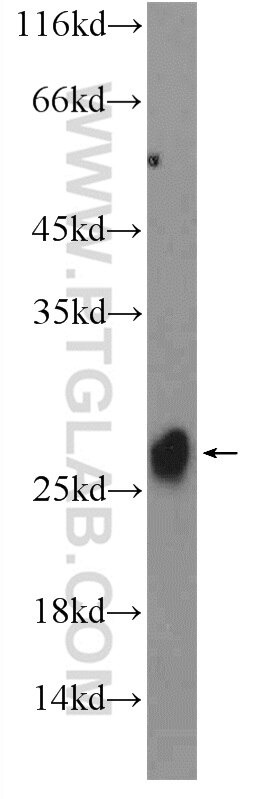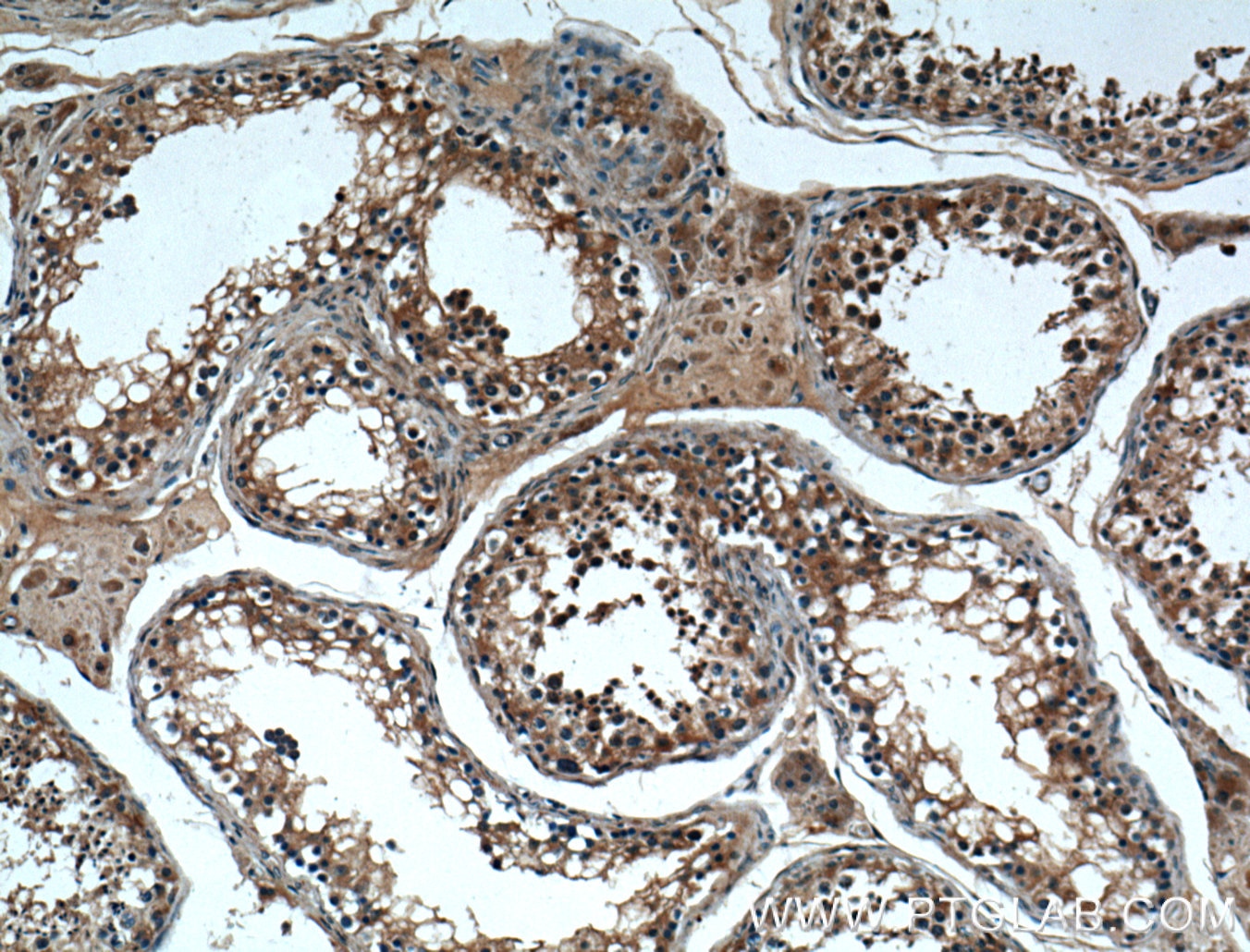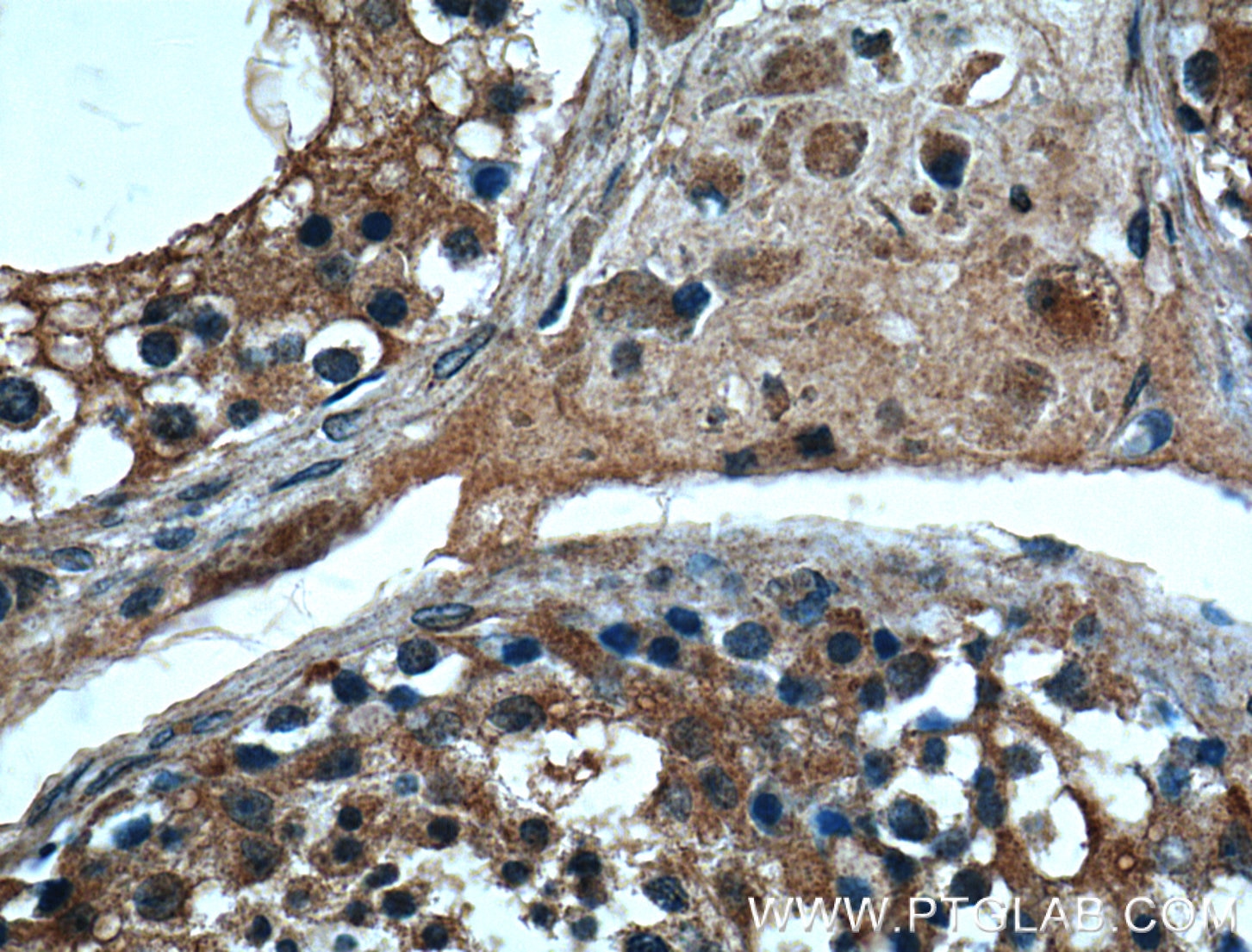MSRB3 Polyklonaler Antikörper
MSRB3 Polyklonal Antikörper für IHC, WB,ELISA
Wirt / Isotyp
Kaninchen / IgG
Getestete Reaktivität
human, Maus, Ratte
Anwendung
WB, IHC, ELISA
Konjugation
Unkonjugiert
Kat-Nr. : 14251-1-AP
Synonyme
Galerie der Validierungsdaten
Geprüfte Anwendungen
| Erfolgreiche Detektion in WB | Maushodengewebe |
| Erfolgreiche Detektion in IHC | humanes Hodengewebe Hinweis: Antigendemaskierung mit TE-Puffer pH 9,0 empfohlen. (*) Wahlweise kann die Antigendemaskierung auch mit Citratpuffer pH 6,0 erfolgen. |
Empfohlene Verdünnung
| Anwendung | Verdünnung |
|---|---|
| Western Blot (WB) | WB : 1:500-1:1000 |
| Immunhistochemie (IHC) | IHC : 1:100-1:400 |
| It is recommended that this reagent should be titrated in each testing system to obtain optimal results. | |
| Sample-dependent, check data in validation data gallery | |
Veröffentlichte Anwendungen
| WB | See 6 publications below |
Produktinformation
14251-1-AP bindet in WB, IHC, ELISA MSRB3 und zeigt Reaktivität mit human, Maus, Ratten
| Getestete Reaktivität | human, Maus, Ratte |
| In Publikationen genannte Reaktivität | Maus, Ratte |
| Wirt / Isotyp | Kaninchen / IgG |
| Klonalität | Polyklonal |
| Typ | Antikörper |
| Immunogen | MSRB3 fusion protein Ag5524 |
| Vollständiger Name | methionine sulfoxide reductase B3 |
| Berechnetes Molekulargewicht | 21 kDa |
| Beobachtetes Molekulargewicht | 26 kDa |
| GenBank-Zugangsnummer | BC040053 |
| Gene symbol | MSRB3 |
| Gene ID (NCBI) | 253827 |
| Konjugation | Unkonjugiert |
| Form | Liquid |
| Reinigungsmethode | Antigen-Affinitätsreinigung |
| Lagerungspuffer | PBS mit 0.02% Natriumazid und 50% Glycerin pH 7.3. |
| Lagerungsbedingungen | Bei -20°C lagern. Nach dem Versand ein Jahr lang stabil Aliquotieren ist bei -20oC Lagerung nicht notwendig. 20ul Größen enthalten 0,1% BSA. |
Protokolle
| Produktspezifische Protokolle | |
|---|---|
| WB protocol for MSRB3 antibody 14251-1-AP | Protokoll herunterladen |
| IHC protocol for MSRB3 antibody 14251-1-AP | Protokoll herunterladen |
| Standard-Protokolle | |
|---|---|
| Klicken Sie hier, um unsere Standardprotokolle anzuzeigen |
Publikationen
| Species | Application | Title |
|---|---|---|
Hum Genet Compound heterozygous mutation of the ASXL3 gene causes autosomal recessive congenital heart disease. | ||
Free Radic Biol Med Loss of methionine sulfoxide reductases increases resistance to oxidative stress. | ||
J Med Food Rice Protein Exerts Endogenous Antioxidant Capacity via Methionine Sulfoxide Reductase and the Nrf2 Antioxidant System Independent of Age. | ||
Food Sci Biotechnol Methionine strengthens anti-inflammation of rice protein via depressing NF-κB activation and stimulating Msr expression in rats fed cholesterol-enriched diets. | ||
J Food Biochem Rice protein stimulates endogenous antioxidant response attributed to methionine availability in growing rats. | ||
J Sci Food Agric l-Methionine activates Nrf2-ARE pathway to induce endogenous antioxidant activity for depressing ROS-derived oxidative stress in growing rats. |




